Euphemisms are an interesting way of expressing yourself without having to directly talk about uncomfortable or unpleasant topics.
From politics to other tough topics in everyday conversation, euphemism examples have been around for centuries and can be used in a variety of situations.
While euphemisms are generally used to make phrases more positive, the meaning can also be misinterpreted or misunderstood.
It’s often easier to convey your intended meaning when speaking rather than writing because you have more context and tone to support your intentions.
In this article, we’ll explore some common types of euphemisms, along with some popular euphemism examples you can use in everyday conversations.
We’ll also give you a few tips on when and how to use them for maximum effect and to avoid hurting anyone’s feelings.
By the end of this article, you will understand:
- Euphemism definition
- Different types of euphemisms
- Examples of euphemisms in everyday life
- Tips on how to use euphemisms effectively
What is a Euphemism?
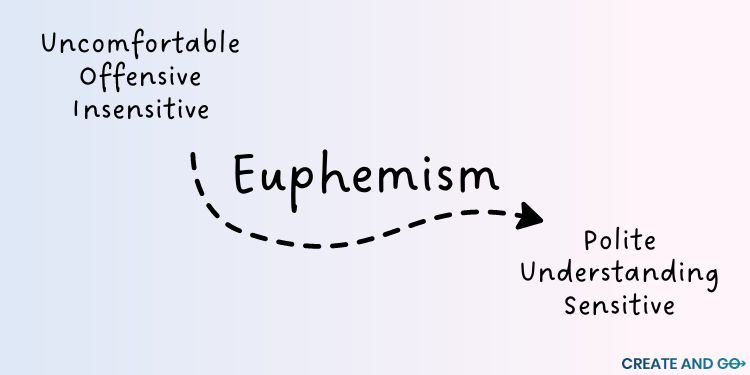
A euphemism is a literary device used to politely, indirectly, or mildly refer to something that may be considered unpleasant, offensive, embarrassing, taboo, or even painful.
Euphemistic language is often used to soften the blow of a message and make it more palatable for the listener.
For example, instead of saying “death” someone might say “passed away” as a way to talk about death without having to address it directly.
A euphemism is a way of spinning a negative word or phrase into a more positive one that can make you or the receiver of the message more comfortable.
Common Types of Euphemisms
Euphemisms are used with a variety of different literary devices in everyday conversation. Here are a few examples:
1. Dysphemism
Dysphemism is the opposite of a euphemism. It is a phrase or word used to express something with a negative connotation in a more direct way.
For example, someone could say “I am living in poverty” instead of saying “I am having financial difficulties.”
2. Figurative Language
This type of euphemism uses figurative language, like metaphors and similies, to make an abstract concept more concrete and easier to understand.
For example, someone might say “I’m feeling a bit under the weather” instead of saying something like “I’m feeling sick.”
Related: 177+ Alliteration Examples
3. Hyperbole
This type of euphemism is used to emphasize the severity or importance of a situation through exaggeration.
For example, someone might say “I’m dying of embarrassment” instead of saying something like “I’m really embarrassed.”
4. Idioms
Idioms are expressions that have figurative meanings that go beyond their literal definitions.
For example, someone might say “I’m in a pickle” instead of saying something like “I’m in a tricky situation.”
Related: 45 Irony Examples + How to Use Irony Effectively
5. Political Correctness
This type of euphemism is used to avoid using words, phrases, or phrases that may be considered offensive or inappropriate.
For example, instead of saying “the disabled” someone might say “people with disabilities.”
Related: Colloquial Examples and How to Use Them
75 Euphemism Examples
Below are some common examples of euphemisms in everyday language in a variety of different situations.
You’ll notice that these well-known euphemisms are mostly in categories for situations that can be quite hard on people. This is because literal words in tough situations can make people uncomfortable.
Euphemistic language is often softer or funnier than literal language.
Death Euphemisms
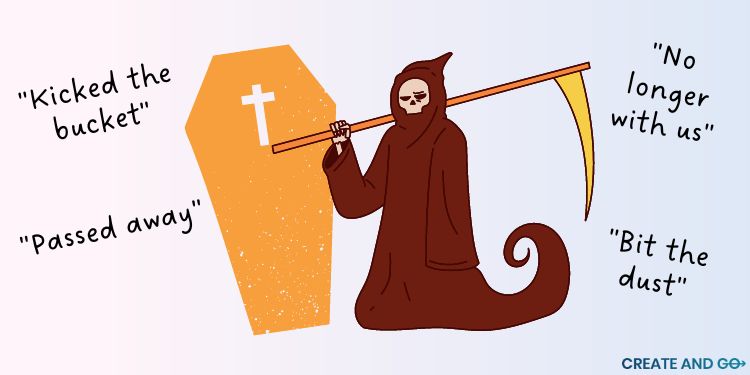
There are many euphemism examples related to death because death is a situation that makes many people feel uncomfortable talking about.
Rather than saying someone died, you could say they:
- “Kicked the bucket”
- “Passed away”
- “Are no longer with us”
- “Are in a better place now”
- “Have gone to a higher place”
- “Bit the dust”
If someone died young, you could say “his life ended too soon.”
When pets die, people often say they “went out to pasture.”
When someone dies unexpectedly, people often say “suddenly,” instead.
Age Euphemisms
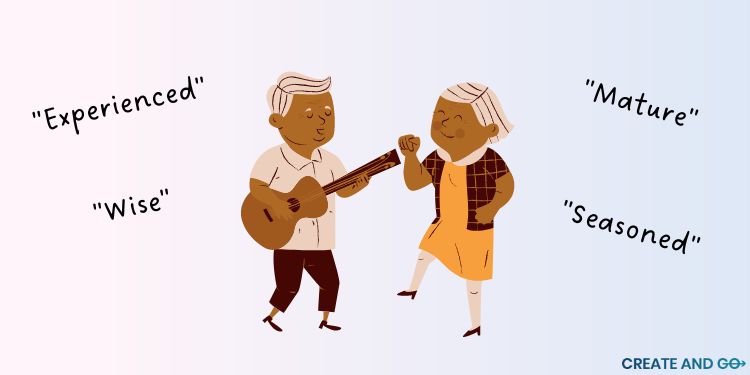
Whether someone is of old age or young, people can be sensitive about their age. This is why we have many common euphemisms for age in our language.
Rather than saying someone is old, you could say they are:
- “Wise”
- “Experienced”
- “Mature”
- “Respectable”
- “Sophisticated”
- “Seasoned”
- “Distinguished”
Rather than saying someone is young (with a negative connotation), you could say they are:
- “Youthful”
- “Eager”
- “Energetic”
- “Vibrant”
- “Fresh”
- “Innocent”
Illness Euphemisms
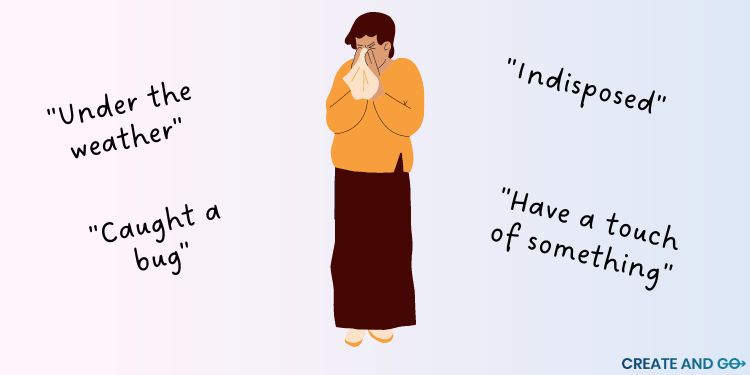
For some reason, people are averse to telling others that they are sick. Whether it’s because their heads are full of snot or because they’re worried about judgment, there are a lot of creative euphemisms people use rather than just saying “I’m sick.”
Rather than saying someone is ill, you could say they:
- “Are feeling under the weather”
- “Have a bug”
- “Are a bit peaked”
- “Not feeling well”
- “Have a touch of something”
- “Feeling poorly”
- “Are indisposed”
- “Take to their bed”
- “Taking it easy”
Financial Euphemisms
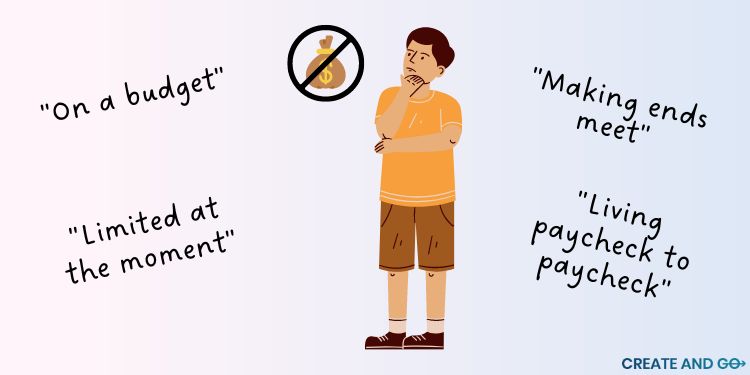
People get weird when talking about money, whether it’s between friends, romantic partners, or colleagues, it’s not always easy admitting to financial trouble.
Rather than saying someone is poor, you could say they are:
- “Living on a budget”
- “Making ends meet”
- “Having financial difficulties”
- “Living paycheck to paycheck”
- “Limited at the moment”
- “Lacking resources”
- “In need of assistance”
- “Facing economic challenges”
- “Financially challenged”
- “Watching their expenses”
Euphemism in the Workplace
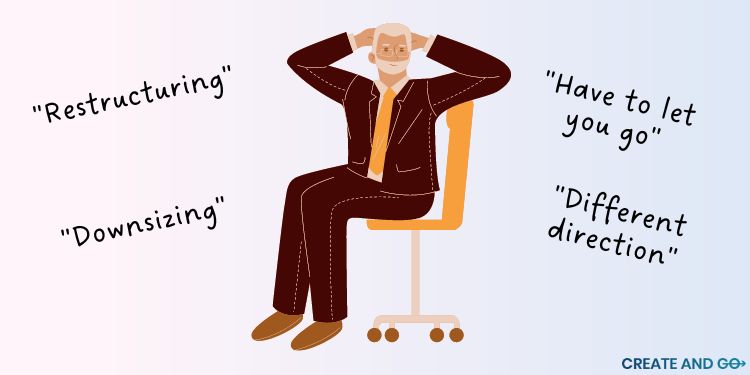
Most of the euphemistic language that you’ll hear in the workplace is around people being fired, which is always an uncomfortable situation for both employee and employer.
Instead of telling someone they are fired, you could say:
- “We’re downsizing”
- “We have to let you go”
- “You’re being laid off”
- “The company decided to restructure”
- “We’re having to make some changes”
- “We have to part ways”
- “The company is taking a different direction”
- “Your position has been eliminated”
- “You’re being reassigned”
Euphemisms in Relationships
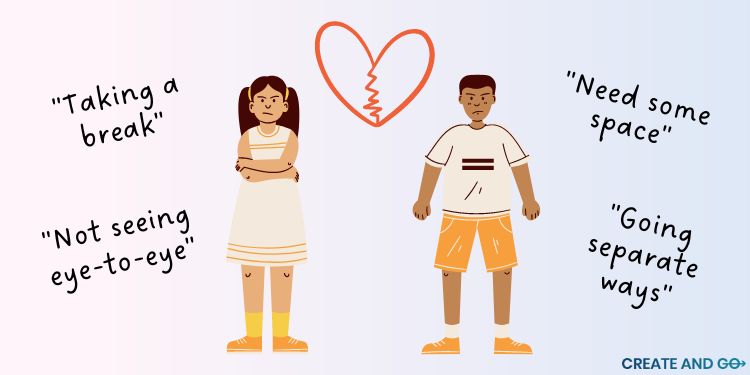
I’m not sure why talking about breakups is considered harsh but for whatever reason, we have a lot of words and phrases to describe this.
Rather than saying “we broke up,” people might say:
- “Taking a break”
- “It didn’t work out.”
- “We decided to go our separate ways.”
- “We grew apart.”
- “It wasn’t the right time.”
- “We just weren’t compatible.”
Rather than admitting to having problems, couples might say:
- “We’re having differences.”
- “We’re not seeing eye to eye.”
- “We’ve hit a rough patch.”
- “We’re having difficulties communicating.”
- “We’re not on the same page.”
- “We are going through a transition period.”
- “We need some space.”
When arguing one might say “Let’s agree to disagree” instead of “I think you’re wrong.”
When someone does something wrong or embarrassing, people often say they “made a mistake” instead of saying they did something bad.
Euphemisms in TV and Film

TV and film often use euphemisms to show a sense of humor or to avoid potential censors or the need for content warnings for offensive language.
- In Big Bang Theory, Sheldon Cooper refers to sexual intercourse as “coitus.”
- In Game Of Thrones, when characters die it is often referred to as “taking the black,” in reference to joining the order of the Night’s Watch.
- In The Office, when characters lose their jobs they often say “they’re going paperless.”
- In Friends, Joey Tribbiani refers to his inability to find employment as “resting” or “on a break.”
- In Forrest Gump, when Forrest’s mother tells him he is slow, she refers to it as “special.”
Euphemisms in Literature

Literature often uses euphemisms to make a story more descriptive or to illustrate a character’s personality.
- In Of Mice and Men, George calls Lennie “nuts” instead of saying he has a mental disorder.
- In Alice in Wonderland, the Queen says, “Off with her head!” rather than kill her outright.
- In Lord of the Flies, when a character dies, it is referred to “sleeping.”
- In The Catcher in the Rye, Holden refers to having intercourse as “doing it.”
- In To Kill a Mockingbird, Atticus Finch tells Jem and Scout that their Aunt Alexandra has gone to “visit her friend” when in fact she has died.
Other Euphemisms in Everyday Language

Here are a few other euphemism examples that are commonly used for other words or situations.
- “Bless their heart” instead of “stupid”
- “That movie was intense” instead of “That movie was scary”
- “Poor hygiene,” instead of “dirty”
- “Had a few too many” instead of “drunk”
- “Passed out” instead of “fainted”
- “Landfill” or “ecological station” instead of dump
- “Correctional facility” instead of “jail”
- “Pass gas” instead of “fart”
When referring to drugs, people usually say “substances,” “chemicals,” or “something illegal.”
Someone could use the phrase “not of sound mind” to refer to someone with a mental illness rather than saying they are “crazy.”
Related: 1500+ Power Words: The Secret to Writing Better Content
FAQs About Euphemism Examples
How to Use Euphemisms Effectively
Euphemistic expressions can be used to make tough conversations easier, but if not used properly, they can also cause more confusion and misunderstanding or even hurt feelings.
A polite euphemism will go a long way toward saving face or helping someone else save face when used the right way.
Here are a few tips for using euphemisms effectively in everyday speech:
1. Make sure you understand the true meaning of the euphemism before you use it. You don’t want to end up with any collateral damage over the misuse of a few words.
2. Consider your intentions. If you’re aiming for humor, remember that not everyone may have the same sense of humor.
3. Don’t overuse euphemisms. Too many can come across as insincere or fake or may make people think that you aren’t taking anything seriously.
4. Know your audience. Some euphemisms may not be appropriate for certain groups or contexts. Be aware of cultural differences and the fact that a word might have an entirely different meaning in another language.
5. Consider the context. Exercise caution when using euphemisms in writing, because your tone is not always immediately understood. Stick to speaking unless you know your audience well.
Key Takeaways on Euphemistic Language
A euphemism is a really helpful literary device to use when you want to lighten up a situation, make a joke, or make someone else feel more comfortable.
Whether you’re talking about death, money, age, bodily functions, sex, or other sensitive subjects – euphemism examples can help make the conversation more pleasant and easier for both parties involved.
Just be sure to use them sparingly and thoughtfully in everyday language to make sure that you aren’t offending anyone.